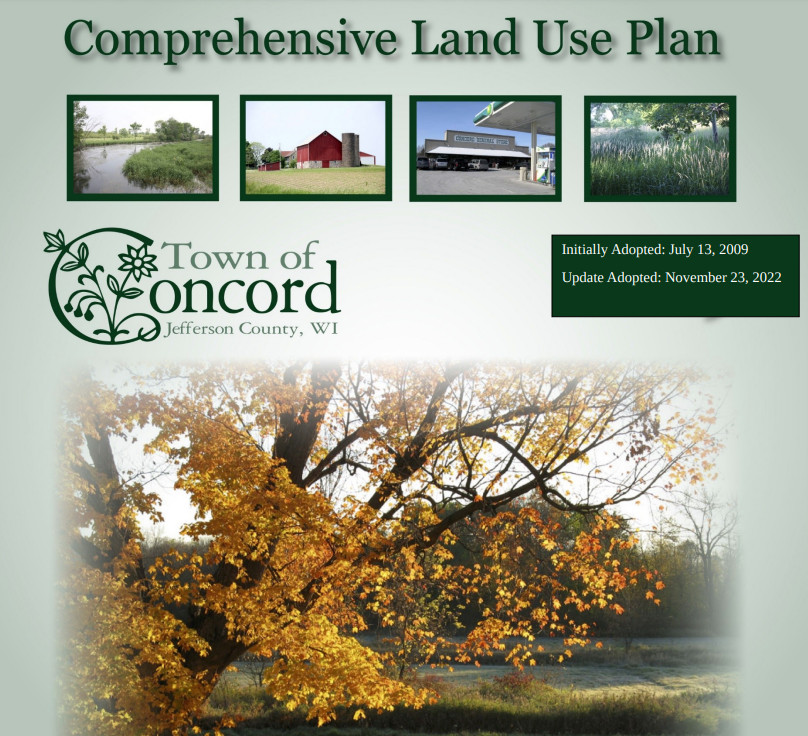
Here is a link to the whole Concord Comprehensive Town Plan (pdf 9MB)
Communities create Comprehensive Town Plans to manage future development and change. Planning is a proactive effort to identify what the community wants to change and what it wants to protect from change before projects are proposed. The planning process involves residents in the creation of the plan so that it reflects the interests and preferences of the community.
A primary objective of a land use plan is predictability. Property owners want to know what may or may not change with the use of land around them. Property owners and developers with interest in new investment want to know what the community is likely to approve before they spend lots of time and money to draft proposals.
In Wisconsin, land use and land division decisions are guided by Comprehensive Plans. State law requires consistency between a zoning action and the Comprehensive Plan. The Town has both a legal and an ethical obligation to follow the plan and honor the voice of the people represented in that plan when making decisions on land use and development issues. When County government is part of the approval process, the Town honors these obligations by clearly citing the applicable plan content to the County, thereby enabling County staff and officials to reinforce the will of Town residents in their actions and decisions.
Concord adopted an update of its Comprehensive Town Plan on November 23, 2022 (see Appendix F:). When Concord's Comprehensive Plan first went into effect in November of 2009, there was a strong desire for Concord to remain a rural community. As part of the plan update process in 2022, a postcard was mailed to all Concord residences, notifying them of the plan update process and inviting them to attend three meetings in the Concord Community Center gym. The meetings were well attended, and the plan was discussed in relatively great detail. The important issue facing Concord is land use, which became the focus of the discussion. The original plan was intended to preserve Concord as a rural agricultural community. People expressed satisfaction with the plan as it has been since 2009 and wanted to continue with the goal of staying a rural community.
A survey was sent to every residence in Concord. A key question was about business development outside of our Hamlet/business district. Below are pictures of the returned surveys divided into two categories by whether people wanted large business development outside the Hamlet or not. (Small businesses that are run as home occupations are allowed; the following applies only to business that would require rezoning to A-2.)
(201 returns) Do not support non-home business outside the Hamlet/business district near I-94 and Hwy F (pdf 20MB)
(37 returns) Do support non-home business outside the Hamlet/business district near I-94 and Hwy F (pdf 3.7MB)
(7 returns) Questionnaires that were ambiguous (pdf 6.7kb)
Results from other questions on the survey (pdf)
The updated plan focuses a little more than the 2009 plan on not removing land in Concord from the Farmland Preservation Program. Many people expressed enthusiasm for Concord’s rural zoning, and the updated plan is intended to reflect that enthusiasm.
Many thanks to Larry Oliverson for coordinating the plan update process and Tom and Sally Williams for the many hours they spent going over many details. Also, thanks to the many Concord citizens who came to meetings and filled out the survey. Citizen involvement is crucial to having a plan that reflects the community.
Thank you also to Jason Valerius and MSA for doing the updates.